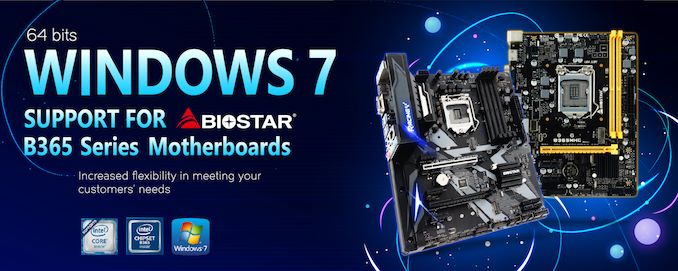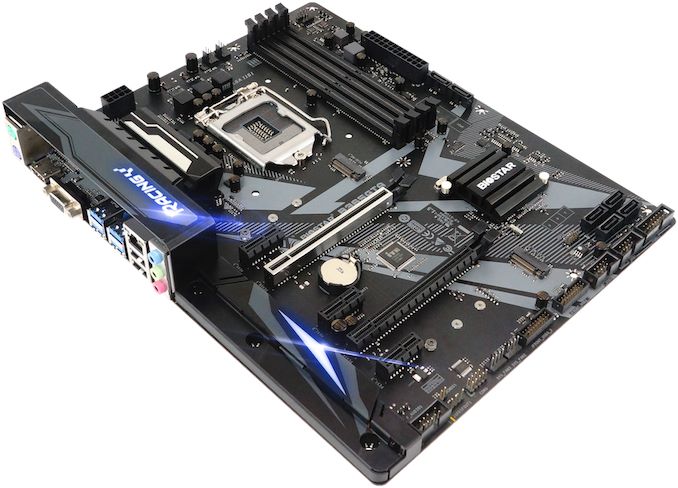BIOSTAR Brings Windows 7 To Intel's B365 Platform: A Core i9-9900K w/ Win7, Anyone?
by Anton Shilov on February 20, 2020 1:30 PM EST- Posted in
- Motherboards
- Intel
- Biostar
- Windows 7
- B365

Even though Microsoft ended regular support for Windows 7 last month, there are millions of customers who continue to use the OS and plan to stick with it for a while to come. But even without essential security updates, trying to use Windows 7 in 2020 comes with an even bigger roadblock: most modern platforms aren't supported by the OS, which limits upgrades and replacement hardware to badly outdated parts. So, in an effort to continue supporting customers who want to use Windows 7 no matter what, BIOSTAR has found a way to install Windows 7 on its B365 chipset-based motherboards, which opens doors to new Windows 7-powered desktops with Intel's latest-generation CPUs.
Released in 2009, Microsoft Windows 7 does not support a host of technologies supported by the latest platforms, which is why Microsoft cut off new hardware support for Windows 7 starting with AMD’s Ryzen and Intel’s Kaby Lake (7th gen Core) platforms. Reciprocally, neither AMD nor Intel officially support Microsoft’s legacy operating systems with drivers for their latest platforms. As a result, while it's not impossible to install Windows 7 on newer hardware, it's certainly something that is discouraged at multiple levels.
But since it's not impossible, BIOSTAR has gone ahead and put together a special tool to simplify the process for users. The tool automatically adds Intel B365-specific features to a Windows 7 SP1 installation image, allowing the OS to be installed on the platform.
Overall, BIOSTAR's method overcomes the three key blocks that prevent Windows 7 from being installed on a new platform: the lack of UEFI loader, an xHCI driver for USB 3.0, and an NVMe driver. These problems can already by surmounted if you know what you're doing, but this is the first time we've seen a manufacturer so directly attempt to support Windows 7 on newer hardware via an easy-to-use method, and thus far BIOSTAR is the only company doing this. Not that it isn't without some peculiarities (described here), but support is support all the same.
BIOSTAR has two Intel B365-based motherboards that can use Windows 7: the ATX form-factor Racing B365GTA aimed at gamers, as well as the Micro-ATX B365MHC targeted at mainstream users. The former supports virtually all Intel LGA1151 processors, including the cream of the crop eight-core Core i9-9900K, whereas the latter can work with chips up to Intel’s eight-core Core i7-9700K.
Overall, BIOSTAR's decision to base their support around the B365 chipset is a curious one on the surface, but something that makes more sense as you dig into the chipset. While Intel’s B365 PCH is a part of the 300-series chipset family, the chipset is essentially a holdover from Intel's earlier 200 series chipsets, and has much more in common with them. So supporting Windows 7 on B365 is much less of a stretch than on Cannon Point chipsets like B360, as BIOSTAR doesn't have to worry about things like Intel's updated USB 3.1 Gen 2 controller or CNVi wireless support.
Related Reading:
- Intel Adds B365 Chipset to Lineup: The Return of 22nm
- BIOSTAR Adds Windows 7 Support To Some Intel and AMD Motherboards
- CES 2019: ASRock's Five New B365 Motherboards
- Microsoft Brings DirectX 12 To Windows 7
- Intel Preps New H310 Chipset Revision With Windows 7 Support For Coffee Lake
- How To Get Ryzen Working on Windows 7 x64
Source: BIOSTAR (via TechPowerUp)











49 Comments
View All Comments
lilkwarrior - Thursday, February 20, 2020 - link
You will never be able to utilize modern hardware properly using Windows 7–especially games & pro apps that'll be using DX12 & WinML that Windows 7 simply doesn't haveNotmyusualid - Thursday, February 20, 2020 - link
Wow, I can't play all 15 DX12-only games? How am I gonna sleep through the night...HowDoesAnyOfThisWork - Friday, February 21, 2020 - link
Don't worry. You will find that you will sleep through the night just fine. Not being able to play all those shiny games does wonders to your natural sleep cycle. ;-PBedfordTim - Friday, February 21, 2020 - link
This will be primarily aimed at industrial systems using hardware without Windows 10 drivers. The consumer versions are just spin offs.LauRoman - Thursday, February 20, 2020 - link
Or a fan of the letter R.JeffFlanagan - Thursday, February 20, 2020 - link
Mostly, it would be for software that can't run on Windows 10, but some people are unable to move on from Win 7 for psychological reasons.PeachNCream - Thursday, February 20, 2020 - link
I have an ex-father-in-law that asks me for occasional computer advice. He still uses Windows 7 because his hobbyist HAM radio gear needs RS-232 (9-pin serial ports) for antenna and satellite dish control. USB to serial adapters that I've tested with him don't seem to work with his equipment and some of his software will not play on Windows 8 or 10. He could probably purchase new software and new control equipment, but it would be pretty expensive (retired, on fixed income) so he's stuck with Windows 7. I've suggested he buy a cheap Win10 system to go online and then keep an air gap via USB thumb drive between 7 and the wider Internet. Not sure if he took my advice or not, but I feel as though he has a semi-valid reason for being chained to 7.willis936 - Friday, February 21, 2020 - link
I keep a W7 machine for similar reasons: parallel port. The use of DMA means USB/PCIe bridges won’t work.As for your case: there is no reason serial can’t work in windows 10 with the use of (probably FTDI) bridges. Counterfeits are rampant, so make sure you get from a reliable source (not amazon).
PeachNCream - Friday, February 21, 2020 - link
I'll have to revisit moving him to W10 someday so this might be helpful for later. It's only a matter of time before one of those dinosaur laptops checks out for good. Thanks!Kstailey - Thursday, February 20, 2020 - link
That's a stupid statement. There's plenty of reasons NOT to move to 10. One being it is unstable. Another being it has a plethora pig bugs.